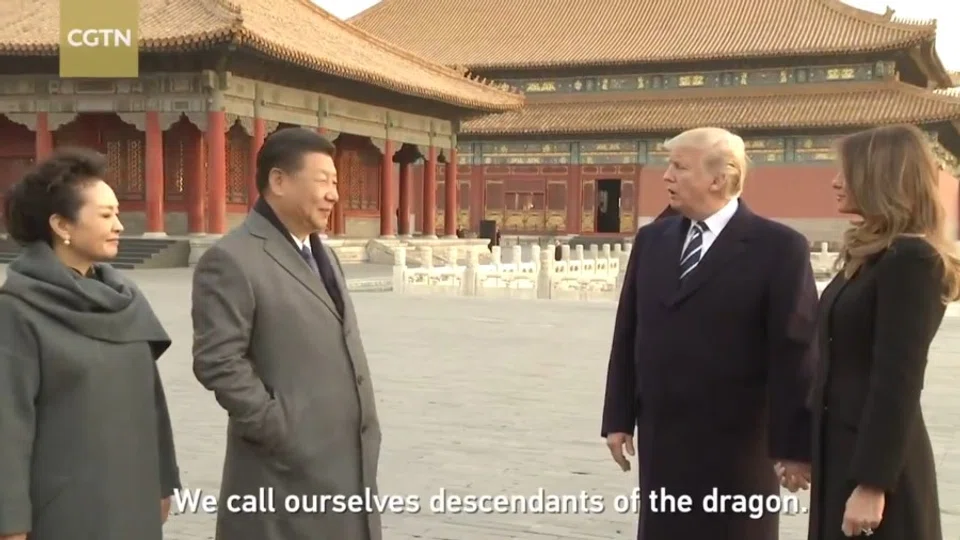The 'historyless' Americans and their arrogance
Hong Kong commentator Chip Tsao notes that the difference between China and the US is that while China is proud of its history, the US takes pride in leaving its history behind in its pursuit of the future. He says this is the reason why when dealing with China, the Americans lose out.

Over the century or so of US-China relations since the time of the Boxer Indemnity, apart from a period where Soong Mei-ling - Madame Chiang Kai-shek - was an ambassador for friendly bilateral relations, the people of the US and China have largely never really understood one another.
First, there is the difference in character between the peoples of the two countries. In interacting with the US, the Chinese are often proud of their so-called 5,000 years of history, and tend to laugh at the Americans for only having 200 years of history, or even no history at all.
Out of etiquette, Americans used to modestly say to the Chinese: yes, our history is not as long as yours.
But what the Chinese will never understand is that the Americans are not ashamed of their short history. On the contrary, they feel that having no history is being free of baggage.
Americans prefer to be free of the shackles of history
In school, American students only have 200 years of history classes to get through; there is not much to say and they spend little time on the subject. The rest of the time is spent on ice hockey, basketball, or technological research.

US automobile tycoon Henry Ford said in 1916: "History is more or less bunk. It is tradition. We don't want tradition. We want to live in the present and the only history that is worth a tinker's dam is the history we make today."
Americans see themselves as a new people, because since their Puritan ancestors crossed the Atlantic and built a new home in North America, they forgot their history and roots.
The American mindset is one of "historylessness" - in their pursuit of the ideal of freedom, they have built a new home in a new land. For America, the things of the past are not a symbol of progress.
When the US was established on 4 July 1776, Thomas Jefferson stressed in his speech that Americans were absolved of tyranny and autocracy. For Americans, history means British colonial rule and religious persecution. History is not something cheerful.
Americans quickly realised that to embrace freedom, they had to let go of history; to have a future, they have to seize the present. And to live in the present, they cannot wallow in the past.
And so, after three or four generations, just a handful of Americans make the long journey back across the Atlantic to Scotland, Ireland, Poland, or Germany to seek their ancestors or visit their graves, or go back to their ancestral homes and trace distant blood relatives.
Americans are only focused on renewing the future and not inheriting the past. They feel there is nothing much worth inheriting. The American mindset is one of "historylessness" - in their pursuit of the ideal of freedom, they have built a new home in a new land. For America, the things of the past are not a symbol of progress.

And so, when US President Donald Trump visited Beijing in 2017, Chinese President Xi Jinping invited him to the Palace Museum, thinking that the heavenly aura of the Han people and the grandeur of the royal palace would stir some admiration in this President tycoon. But Trump said to Xi: "So this is your original form of culture?" Chinese people did not get the meaning behind the words.
...when China deals with the US, they always remember the weakness and naivety of Americans.
Americans feel that one can only pursue happiness by coming out of the shadow of history. And so, when the Soviet Union was dissolved, American political scientist Francis Fukuyama carelessly wrote The End of History and the Last Man, prematurely saying that the collapse of communism signalled the victory of American democracy.
However, philosophically speaking, history will not end, and so the "end of history" is a fallacy, because as long as humans exist, all memory is history. But Americans have no patience - the "end of history" stands for American arrogance, rather like the Oedipus complex of a son hating his own father.
This is why when the US deals with China, the US loses out because Americans do not value the history of US-China relations. However, when China deals with the US, they always remember the weakness and naivety of Americans.
This article was first published in Chinese on CUP media as "「無歷史狀態」的美國式傲慢".
Related: History lessons: Who gets to decide what is humiliating, unfair, right or wrong? | Ray Dalio at the China Development Forum: What can history tell us about the rise of China? | Why intellectuals failed to flourish throughout 5000 years of China's history | Why modernising China is so difficult | Us and them: Lessons from ancient China about demonising 'enemies'



![[Photos] Fact versus fiction: The portrayal of WWII anti-Japanese martyrs in Taiwan](https://cassette.sphdigital.com.sg/image/thinkchina/3494f8bd481870f7c65b881fd21a3fd733f573f23232376e39c532a2c7593cbc)

